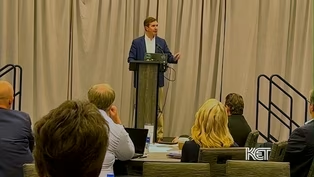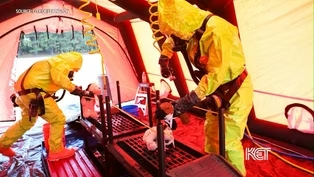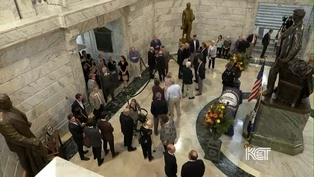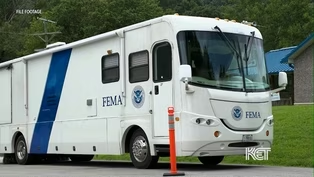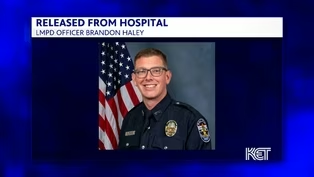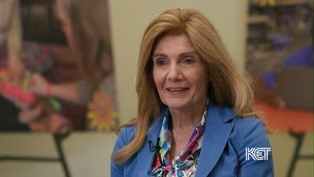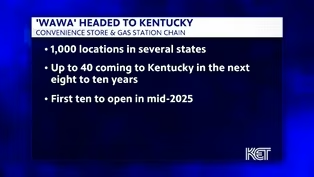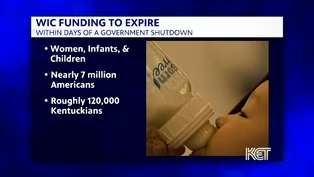
Making Machines Learn
Clip: Season 2 Episode 84 | 3m 48sVideo has Closed Captions
Researchers at the U.K. are figuring out how to use A.I. in manufacturing.
Researchers at the University of Kentucky are figuring out how to use artificial intelligence in manufacturing.
Problems playing video? | Closed Captioning Feedback
Problems playing video? | Closed Captioning Feedback
Kentucky Edition is a local public television program presented by KET

Making Machines Learn
Clip: Season 2 Episode 84 | 3m 48sVideo has Closed Captions
Researchers at the University of Kentucky are figuring out how to use artificial intelligence in manufacturing.
Problems playing video? | Closed Captioning Feedback
How to Watch Kentucky Edition
Kentucky Edition is available to stream on pbs.org and the free PBS App, available on iPhone, Apple TV, Android TV, Android smartphones, Amazon Fire TV, Amazon Fire Tablet, Roku, Samsung Smart TV, and Vizio.
Providing Support for PBS.org
Learn Moreabout PBS online sponsorshipThe rise of artificial intelligence or A.I., has people questioning the future of everything from education and jobs to cybersecurity and robots.
Now, researchers at the University of Kentucky are figuring out how I can be used in manufacturing.
The group is focused on machine learning instead of telling a machine specifically what to do.
Hey, AI helps machines figure it out on their own.
We try to apply machine learning to manufacturing fields, but we try to make it in a much more explainable and deployable manner than just simply having all these complex equations, these really complicated models.
We want to actually see these things out in the world deployed.
And the only way to really do that is to make the models trustworthy or make them understandable to a normal person.
This is a pilot project related to a robotic assembly.
As you can see here, we try to apply robot to assemble multiple projects together.
The goal would be try to reduce and minimize that dimension with the assemble.
And we have our computer vision system.
So through the cameras you find the cameras according to cameras.
We can take a picture of what's happening on the table continuously.
And if you like to watch the image processing and the machine learning algorithms, we can identify how many objects are on the table, where all the objects and the shapes and dimensions, how objects and that information we all pass down to the robot.
So the robotic price motion accordingly and pick the objects one by one and assemble them together.
If the robot cannot accurately understand that information or only utilize that information, it will also lead to a failure that the robot can not to pick up the object or pick up that, but not successfully.
And we will design serious failure detection mechanisms and try to help the robot reliably and robotically to finish the work.
So the Google, we're integrating AI and machine learning solutions in manufacturing ways to help humans make better decisions or to fully automate manufacturing process or systems.
The whole point of manufacturing is high output, high quality redundancy, and there's still a ton of things that are manually done, either quality control or in or performance or assembly operation, so and so forth.
Well, the more manual labor you need that, the less and less consistency you get.
That's just the factor of humanity.
And so by incorporating machine learning, we get this more concurrent workflow and more stability.
So that's kind of what we're looking at as these novel ways of producing email to traditionally where humans are involved.
So if we can kind of cut out some of those those human aspects, we can, you know, get our process planning better and overall more stable.
Dr. Wong and his students are collaborating with companies like General Motors and General Electric Electric to access manufacturing plant data to bridge the gap between their laboratory simulat
Video has Closed Captions
Clip: S2 Ep84 | 1m 32s | Kentucky Governor Beshear speaks on education. (1m 32s)
Headlines Around Kentucky (9/26/23)
Video has Closed Captions
Clip: S2 Ep84 | 1m 42s | A western KY judge has been temporarily replaced and a celebration of bourbon workers. (1m 42s)
KY Leaders Reflect on Gov. Jones' Legacy
Video has Closed Captions
Clip: S2 Ep84 | 3m 11s | Kentucky leaders reflect on the legacy of former Governor Brereton Jones. (3m 11s)
Lessons Learned From Disasters
Video has Closed Captions
Clip: S2 Ep84 | 3m 12s | New Handbook to give city leaders more guidance on how to respond when disaster strikes. (3m 12s)
LMPD Officer Released From Hospital
Video has Closed Captions
Clip: S2 Ep84 | 37s | LMPD Officer Brandon Haley was released from the hospital during recovery from shooting. (37s)
Nonprofit Celebrates 140 Years In Louisville
Video has Closed Captions
Clip: S2 Ep84 | 3m 47s | One of Louisville's oldest businesses and nonprofits celebrates 140 years. (3m 47s)
Video has Closed Captions
Clip: S2 Ep84 | 20s | Convenience store and gas station chain WAWA is expanding to Kentucky. (20s)
WIC Funding And Government Shutdown
Video has Closed Captions
Clip: S2 Ep84 | 1m 55s | How WIC funding would be disrupted by a government shutdown. (1m 55s)
Providing Support for PBS.org
Learn Moreabout PBS online sponsorship
- News and Public Affairs

Top journalists deliver compelling original analysis of the hour's headlines.

- News and Public Affairs

FRONTLINE is investigative journalism that questions, explains and changes our world.












Support for PBS provided by:
Kentucky Edition is a local public television program presented by KET
